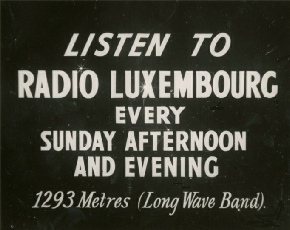© 2014-

Challenging the state monopolies (3)
The Bubble Bursts
Despite these Government actions the European commercial stations were extremely popular in Britain but just as they were becoming really successful the start of the Second World War put an end to alternative radio programmes for British audiences and advertisers as transmitters across Europe were closed or destroyed by the invading German Army.
The IBC offered its entire facilities to the War Office to establish an entertainment station for troops and for use as a possible propaganda outlet for the Allies but this was refused. The British Government did, however, persuade the French authorities to use Radio Normandy's transmitters in 1940 to broadcast programmes under the call sign Radio International, but this outlet was itself forced to close in early 1941 when German troops arrived at Fecamp. Meanwhile, the IBC's premises in central London were severely bomb damaged during the Blitz and the organisation was never able to broadcast again after the War, although it did continue to operate as a recording studio and produced some programmes for Radio Luxembourg. The IBC became a shareholder in the first licensed independent radio station, LBC (London Broadcasting Company) when it was launched in October 1973.
Although Radio Luxembourg’s English language transmissions closed on 18th September 1939 its domestic service continued until 10th May 1940 when invading German forces over-
In September 1944 a special task force of the American 12th Army liberated the Luxembourg station which then became "the voice of the Supreme HQ of the Allied Expeditionary Force (SHAEF)" -
During this period Winston Churchill had top secret plans for Radio Luxembourg's transmitter. The plan involved using the transmitter, backed by land-
In November 1945 the s tation was handed back to the Luxembourg Government and English language broadcasts from the Junglinster transmitter resumed in January 1946 on 1293m long wave.The station also broadcast programmes directed at Dutch, French and German audiences.
tation was handed back to the Luxembourg Government and English language broadcasts from the Junglinster transmitter resumed in January 1946 on 1293m long wave.The station also broadcast programmes directed at Dutch, French and German audiences.
In 1951 a new medium wave transmitter was brought into use and the English language service was transferred to 208m. It was this outlet which, until the arrival of the offshore broadcasters in the mid 1960s, provided listeners in Britain with a regular nightly source of popular music programmes. Radio Luxembourg’s evening English Service on 208m medium wave finally closed in December 1991, while shortwave and satellite services continued for another 12 months before they too were terminated as being commercially unviable.
However, many other newly liberated governments in Europe after the end of the Second World War decided to impose tight controls over radio broadcasting within their boundaries. The returning French Government announced in 1945 that it would not issue any private radio station licences at all. (Radio Normandy's premises and transmitters had in fact been destroyed in battles after the D-

Radio Luxembourg jingle, 1950s





Ground
Floor
Back to




State Monopolies and International Agreements









Back to Gallery index

